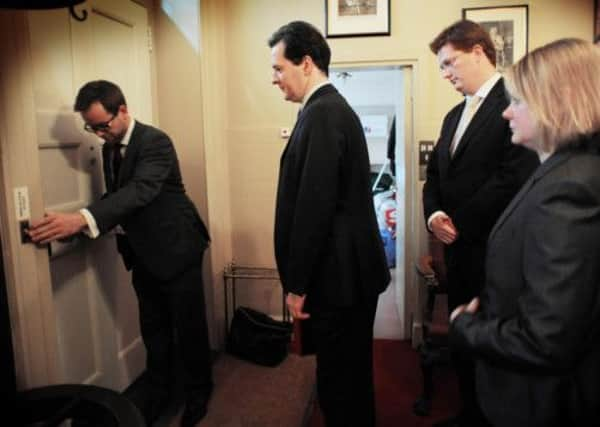Mark Stuart: How Osborne can get it right this time, but why his posh pals will not let him


The Chancellor of the Exchequer must atone for his disastrous Budget of last year, in which he put his party’s needs above those of the country by reducing the top rate of income tax from 50p to 45p.
With one eye on succeeding David Cameron as Conservative leader and Prime Minister, Osborne wanted to prove his Thatcherite credentials to the Tory right-wing. The measures he quickly concocted to pay for that outrage – the now infamous “pasty tax”; the caravan tax; and the national heritage tax – offended almost every aspiring Conservative voter in the land.
Advertisement
Hide AdAdvertisement
Hide AdThe political cost of Osborne’s last Budget was huge. Up until that point, his Liberal Democrat partners had acted as a useful human shield for difficult public spending cuts, and had taken all the political pain. But if we look at the moment when the voters turned their fire against the Conservatives, it was Osborne’s 2012 Budget.
Now, the man who was famously booed at the Olympics last summer will try to pull a fresh set of rabbits of out his Treasury hat. I once remarked to a dear-departed Yorkshire businessman that the Chancellor had run out of rabbits. Back came the reply: “The hat’s gone ’n all.”
What Osborne needs to avoid doing is introducing ill thought out Government schemes. More Government is not the answer, particularly in light of a coalition Work Programme that has resulted in fewer people returning to employment than if they had been left to their own devices. Meanwhile, Osborne’s other ruse – to encourage banks to lend more to businesses – has actually resulted in a fall in bank lending.
In fact, the best measure of all wouldn’t cost the Chancellor any money. Osborne has to stop talking down the British economy. Every time he mentions the mountain of debt that he was bequeathed by Labour, the media paints the economy in a gloomy light, and consumers hold back from making spending decisions which would kick-start the recovery. A political tactic that was designed in Opposition by Osborne to bury Gordon Brown should not be carried any further forward as an economic strategy for government.
Advertisement
Hide AdAdvertisement
Hide AdWhat is needed, instead, are measures that put money into people’s pockets, while raising sufficient revenue from those high earners that can most afford to pay. Overall, Osborne has got the balance wrong between cutting public expenditure and raising revenue.
Raising the threshold for paying income tax in one fell swoop to £10,000 would be a good start. This measure will have two benefits, one political, one economic. Firstly, it would please the Conservative’s coalition partners, the Liberal Democrats, fulfilling one of their 2010 General Election manifesto commitments. And secondly, by lifting lower earners out of tax, it would save on the expensive administration of tax credits.
Another measure that would simultaneously please the Liberal Democrats, and shoot a Labour fox, is introducing some kind of a mansion tax on expensive properties. For a long time now, York-born Vince Cable, the Secretary of State for Business, Innovation and Skills, has been rightly pointing out that it is wealth that needs to be taxed rather than income. In the last few years, the prosperous parts of London have been bought up by rich oligarchs from Saudi Arabia and Russia. It is high time that these people paid something back into the British economy.
Such egalitarian tax-raising measures would not only allow Osborne to cut the deficit, they also would at least lend a modicum of credibility to that now tired Tory slogan “We’re all in this together”.
Advertisement
Hide AdAdvertisement
Hide AdA large chunk of the revenue raised needs to be put into cutting fuel duty. It is obscene that one quarter of an average person’s income now goes on running a car.
The rest of the money raised needs to be directed into doing something old-fashioned: building houses. Back in 1951, a Conservative party was re-elected partly because it promised to build 300,000 new homes.
Now, 60 years later, George Osborne has the chance to emulate the then housing Mmnister, Harold Macmillan, who fulfilled his promise, helping the Conservatives to retain power for 13 years from 1951 to 1964.
Ironically, the person who might save the Chancellor’s career is unelected and not even British. His name is Canadian-born Mark Carney, the new Governor of the Bank of England, who wants to put growth as a priority over inflation.
Advertisement
Hide AdAdvertisement
Hide AdWhen Carney takes up his post in July, his innovative ideas of letting the Bank of England purchase bundles of small business loans need to be tried, not least because everything else has thus far failed.
So, the present Chancellor has a chance to redeem himself tomorrow to atone for last year’s mistakes. But he won’t because the truth about George Gideon Oliver Osborne is that most of his chums are hedge fund manages and oligarchs.
As he showed with the pasty tax debacle, “Gideon” doesn’t have a clue about what ordinary people are going through at the moment. Eccentric though Nadine Dorries is, she was right about one thing: we are governed by two posh boys who don’t know the price of milk.